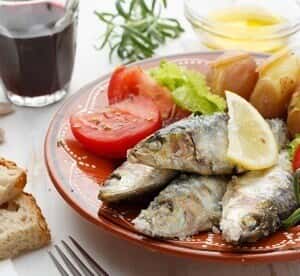
Most older people would like to know how to maintain their brain power as they age. There are no pills that will do this, but a new randomized controlled trial suggests that a combination of a healthy diet and moderate-intensity aerobic exercise can make a difference (American Journal of Clinical Nutrition, June 2021).
Staying Active and Eating Right Helps Sustain Brain Power:
Roughly 1,400 Finnish men and women between 57 and 78 years of age participated in the four-year study. The investigators assigned them to exercise, diet alone, the combination or neither (control). Some volunteers did resistance exercise, while others did aerobic exercise.
The study diet was rich in vegetables, fruit and berries. Participants in the diet groups ate two or more servings of fish weekly. They also aimed for less than 10 percent of their calories from saturated fatty acids. These volunteers took a battery of neuropsychological tests when the study started, after two years and when it finished.
Neither exercise nor diet alone made a difference. However, aerobic exercise and a healthful diet together seemed to improved cognition. The scientists note that these volunteers were already physically active before the study started, which might explain why meeting the exercise goals didn’t improve their scores.
As the researchers conclude,
“even small effects of long-term and multifaceted lifestyle interventions may postpone cognitive impairment in older individuals.”
Looking for a Healthy Diet for Lasting Brain Power:
An earlier study showed that a combination of the Mediterranean diet and the DASH diet helps older people stay sharp longer. The diet is called MIND, for Mediterranean-DASH Diet Intervention for Neurodegenerative Delay. Scientists tested this approach with 960 elderly Chicago residents over five years (Alzheimer’s & Dementia, Sep. 2015).
DASH Diet:
The DASH diet (rich in vegetables, whole grains, fruits and low-fat dairy) has been shown to help control both blood pressure (New England Journal of Medicine, Apr. 17, 1997) and cholesterol (British Journal of Nutrition, Nov. 28, 2014). In the Black Women’s Health Study, those who ate a DASH-type diet were 25% less likely to die during the 16-year time period (Journal of Nutrition, March, 2015). But does it boost brain power?
Mediterranean Diet:
A Mediterranean-style diet is based on vegetables, nuts, legumes and fish. The diet includes wine in moderation and uses olive oil as its primary fat. This eating pattern has been linked to multiple health benefits such as better blood sugar control in diabetes (BMJ Open, Aug. 10, 2015), less trouble with acid reflux (Diseases of the Esophagus, Oct. 2016), improved heart health (Annual Review of Nutrition, July 17, 2015) and stroke prevention (Stroke, July 2015), among other things. The PREDIMED randomized controlled trial in Barcelona, Spain, showed that following a Mediterranean diet with extra olive oil or nuts helped preserve brain power with aging (JAMA Internal Medicine, July 1, 2015).
The MIND Diet:
The Chicago study did not assign people to specific diets, but it did keep careful records of their dietary habits. These elderly Chicagoans were graded according to how closely they followed combination DASH/Mediterranean diet criteria. Their cognitive function was also tested periodically. Those who stuck most closely to the diet ended up with an average mental age 7.5 years younger than those who cheated most.
The diet that helped their brain power includes whole grains, salad, vegetable and a glass of wine daily, chicken and beans twice weekly, and fish at least once a week. Olive oil is used instead of butter or margarine. There are no sweets in the diet and berries are the only fruits.
Citations
- Komulainen P et al, "Exercise, diet, and cognition in a 4-year randomized controlled trial: Dose-Responses to Exercise Training (DR's EXTRA)." American Journal of Clinical Nutrition, June 2021. https://doi.org/10.1093/ajcn/nqab018
- Morris MC et al, "MIND diet slows cognitive decline with aging." Alzheimer's & Dementia, Sep. 2015. DOI: 10.1016/j.jalz.2015.04.011
- Appel LJ et al, "A clinical trial of the effects of dietary patterns on blood pressure. DASH Collaborative Research Group." New England Journal of Medicine, Apr. 17, 1997. DOI: 10.1056/NEJM199704173361601
- Siervo M et al, "Effects of the Dietary Approach to Stop Hypertension (DASH) diet on cardiovascular risk factors: a systematic review and meta-analysis." British Journal of Nutrition, Nov. 28, 2014. DOI: 10.1017/S0007114514003341
- Boggs DA et al, " Higher diet quality is inversely associated with mortality in African-American women." Journal of Nutrition, March, 2015. DOI: 10.3945/jn.114.195735
- Esposito K et al, "A journey into a Mediterranean diet and type 2 diabetes: a systematic review with meta-analyses." BMJ Open, Aug. 10, 2015. DOI: 10.1136/bmjopen-2015-008222
- Mone I et al, "Adherence to a predominantly Mediterranean diet decreases the risk of gastroesophageal reflux disease: a cross-sectional study in a South Eastern European population." Diseases of the Esophagus, Oct. 2016. DOI: 10.1111/dote.12384
- Shen J et al, "Mediterranean dietary patterns and cardiovascular health." Annual Review of Nutrition, July 17, 2015. DOI: 10.1146/annurev-nutr-011215-025104
- Lakkur S & Judd SE, "Diet and stroke: Recent evidence supporting a Mediterranean-style diet and food in the primary prevention of stroke." Stroke, July, 2015. DOI: 10.1161/STROKEAHA.114.006306
- Valls-Pedret C et al, "Mediterranean diet and age-related cognitive decline: A randomized clinical trial." JAMA Internal Medicine, July 2015. DOI: 10.1001/jamainternmed.2015.1668

